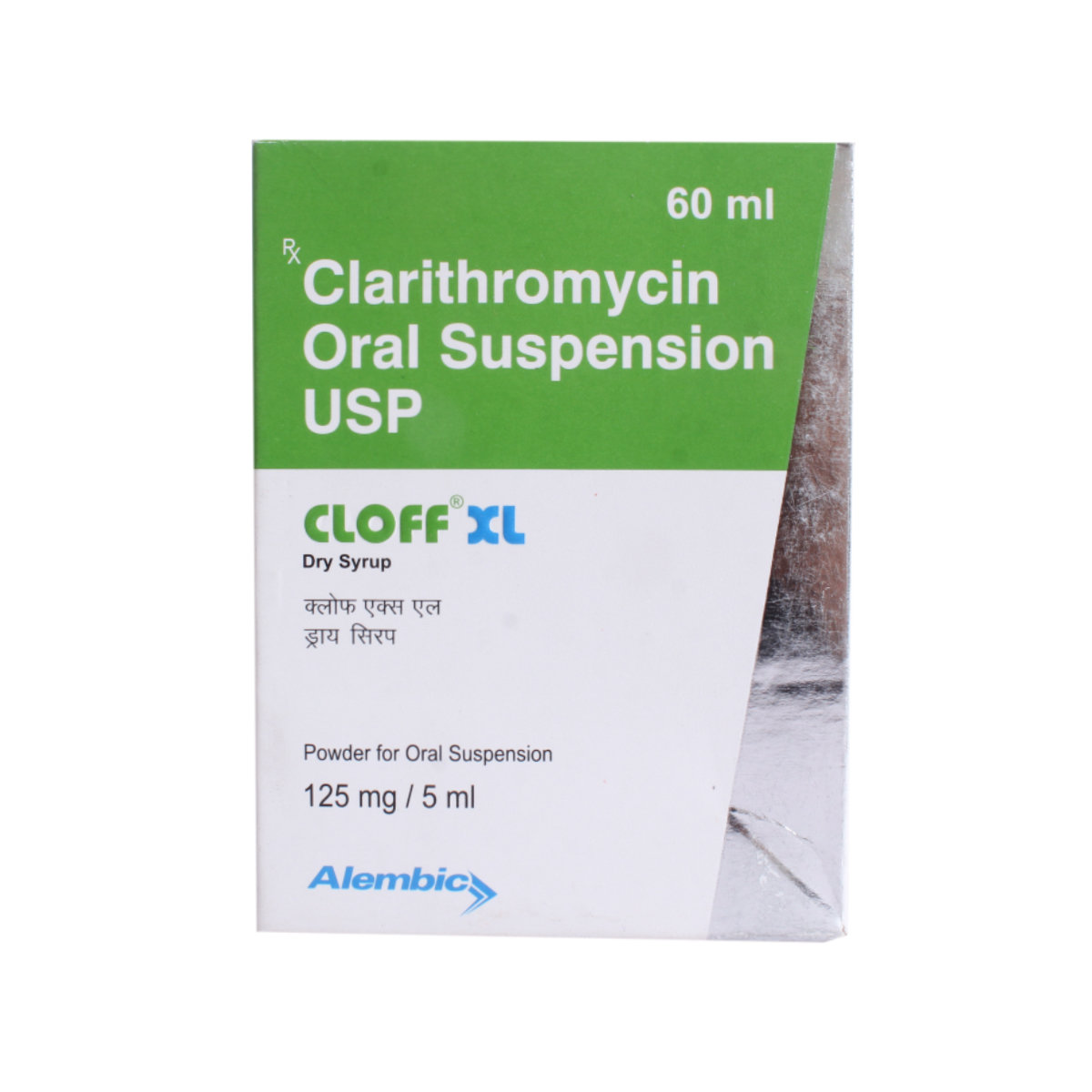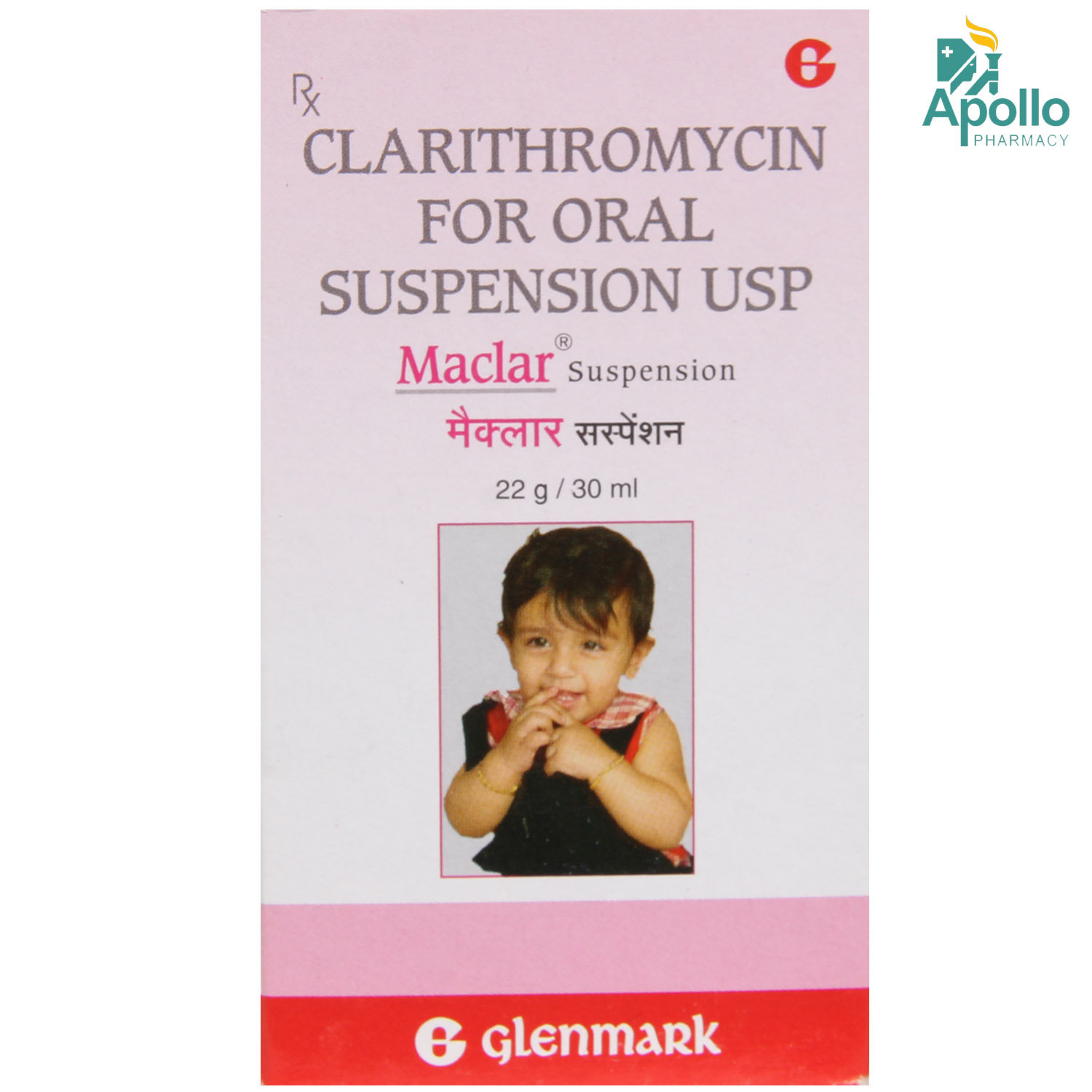Crixan 125 Suspension 30 ml
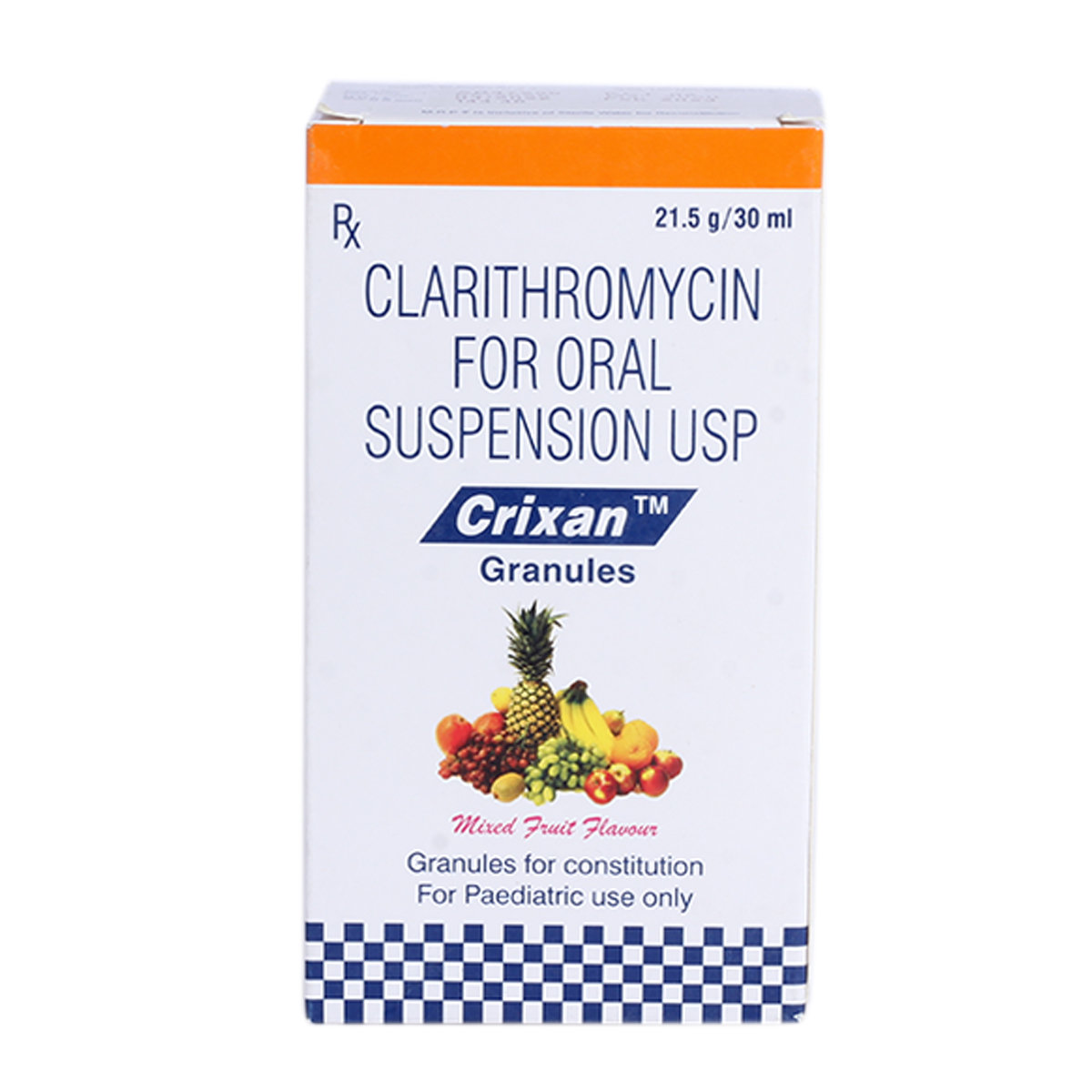
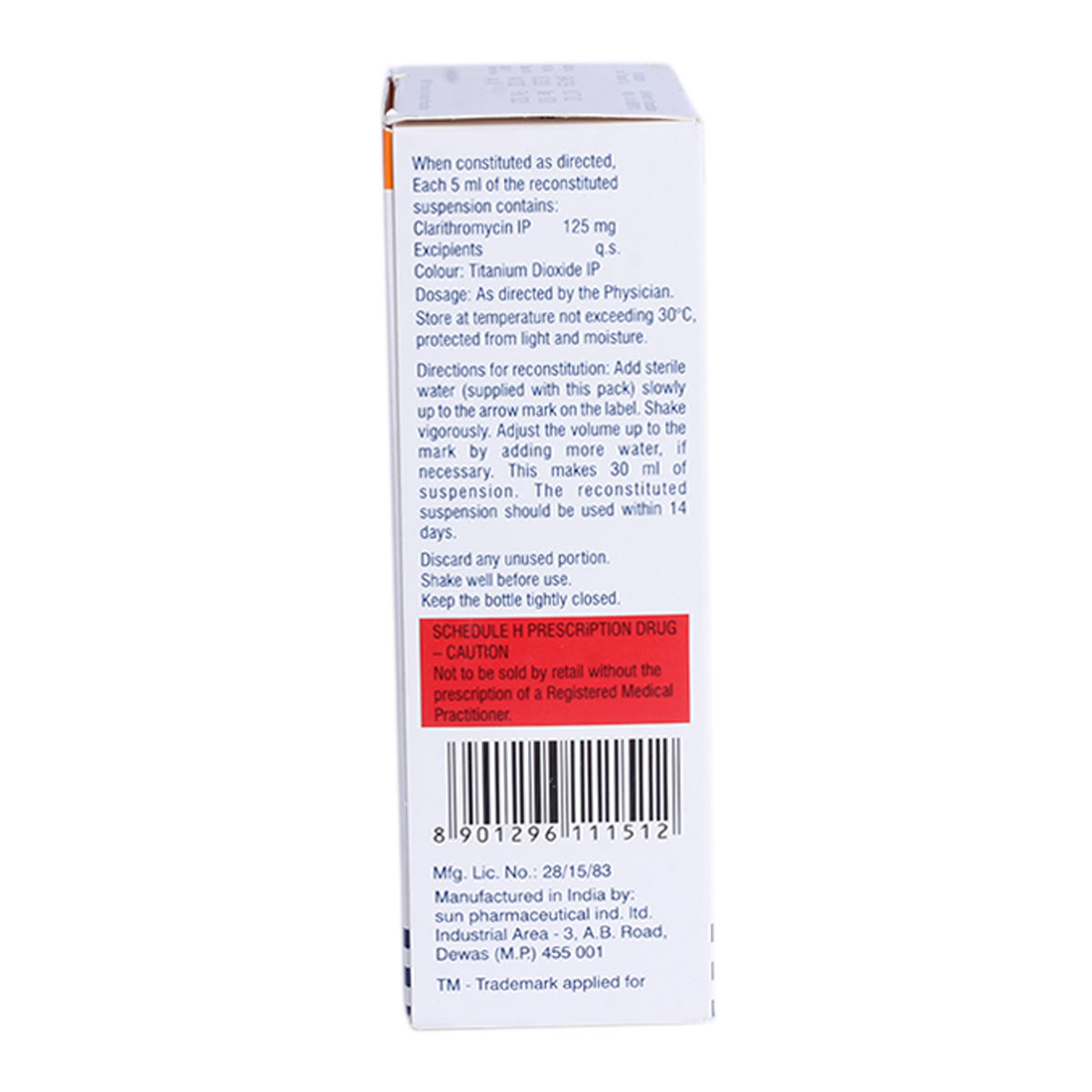
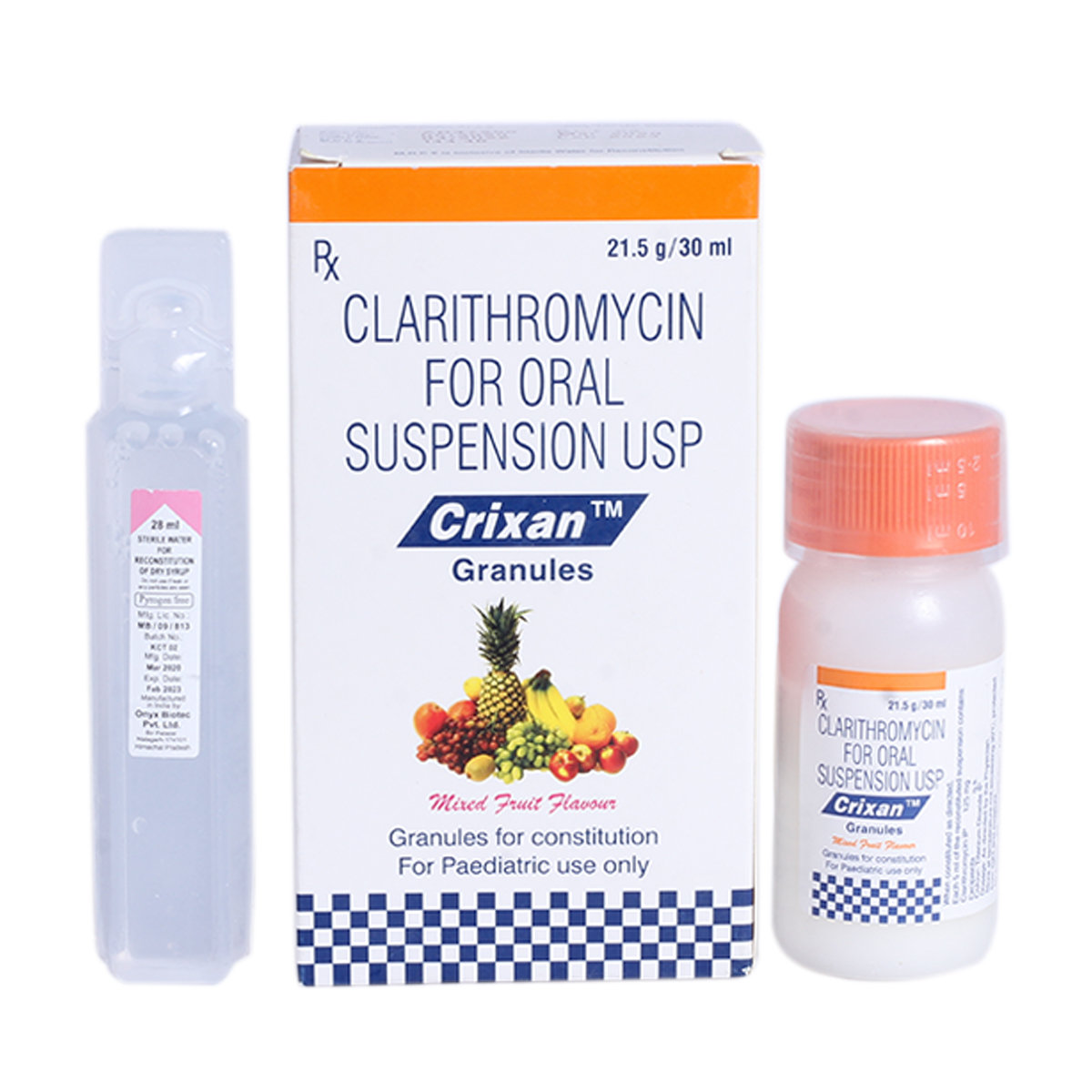



MRP ₹154.5
(Inclusive of all Taxes)
₹23.2 Cashback (15%)
Provide Delivery Location
Online payment accepted
 Prescription drug
Prescription drugWhats That
Composition :
Manufacturer/Marketer :
Consume Type :
Return Policy :
Expires on or after :
NPPA :
About Crixan 125 mg Suspension
Crixan 125 mg Suspension belongs to a group of medicine called macrolide antibiotics derived from Saccharopolyspora erythraea (originally called Streptomyces erythreus), used to treat a wide range of bacterial infections. A bacterial infection is a condition in which bacteria grow in the body and cause infection. It can target any body part and multiple very quickly. Antibiotics inhibit the growth of microorganisms and are given to treat bacterial infections.
Crixan 125 mg Suspension contains Clarithromycin (antibiotic). It inhibits the protein synthesis process required for the growth of the bacterial cell. As a result, bacterial cells are not able to reproduce and grow. Thus, Crixan 125 mg Suspension helps in the prevention of infections.
Like all medicines, Crixan 125 mg Suspension may cause some common side effects, including feeling sick (nausea), diarrhoea and being sick (vomiting), loss of appetite, bloating and indigestion, headaches and difficulty sleeping. Most of these side effects do not require medical attention and gradually resolve over time. However, if you notice any of these side effects persist or worsen your child’s condition, inform your doctor immediately.
Inform your doctor about your child's entire medical history. Other drugs or supplements should not be combined with Crixan 125 mg Suspension unless prescribed by a doctor. Even if your child is feeling better, do not miss any dose and complete the entire course of medication. Stopping the medication too soon may cause the infection to recur or worsen.
Uses of Crixan 125 mg Suspension
Directions for Use
Medicinal Benefits
Crixan 125 mg Suspension belongs to the macrolide class of antibiotics which is effective against a wide range of bacteria, including gram-negative, gram-positive bacteria, anaerobes, and some parasites (like Balantidium coli and Entamoeba species). It is prescribed for treating various bacterial infections, including chest infections such as pneumonia, skin problems such as cellulitis, and ear infections; on the other hand, it is also used in combination with other medicines to treat duodenal ulcers caused by H. pylori (Helicobacter pylori).
Storage
- Regularly brush and floss your teeth.
- Rinse your mouth with water and baking soda a solution to neutralize acid in the mouth. This makes your food taste as it should.
- Drink plenty of water or non-caffeinated drinks to prevent dry mouth which may lead to altered taste.
- Try ginger, peppermint, fruit or green teas, lemonade, ginger ale or fruit juice to help mask unpleasant tastes.
- Try sucking on sugar-free ice pops or ice cubes to prevent dry mouth.
- Inform Your Doctor: Notify your doctor immediately about your diarrhoea symptoms. This allows them to adjust your medication or provide guidance on managing side effects.
- Stay Hydrated: Drink plenty of fluids to replace lost water and electrolytes. Choose water, clear broth, and electrolyte-rich drinks. Avoid carbonated or caffeinated beverages to effectively rehydrate your body.
- Follow a Bland Diet: Eat easy-to-digest foods to help firm up your stool and settle your stomach. Try incorporating bananas, rice, applesauce, toast, plain crackers, and boiled vegetables into your diet.
- Avoid Trigger Foods: Steer clear of foods that can worsen diarrhoea, such as spicy, fatty, or greasy foods, high-fibre foods, and dairy products (especially if you're lactose intolerant).
- Practice Good Hygiene: Maintain good hygiene to prevent the spread of infection. To stay healthy, wash your hands frequently, clean and disinfect surfaces regularly, and avoid exchanging personal belongings with others.
- Take Anti-Diarrheal Medications: If your doctor advises, anti-diarrheal medications such as loperamide might help manage diarrhoea symptoms. Always follow your doctor's directions.
- Keep track of your diarrhoea symptoms. If they don't get better or worse or are accompanied by severe stomach pain, blood, or dehydration signs (like extreme thirst or dark urine), seek medical help.
Drug Warnings
Before using Crixan 125 mg Suspension, let your doctor know about all your children's medical conditions, sensitivities, and all medications used. Do not use any other drugs or supplements with Crixan 125 mg Suspension unless prescribed by the doctor. Iron and antacid (like magnesium hydroxide and aluminium hydroxide) may bind to Crixan 125 mg Suspension in the gastrointestinal tract, lowering its efficiency. So, a gap of at least 2 hours should be maintained between intake of Crixan 125 mg Suspension and iron supplements and antacids.
Drug-Drug Interactions
Drug-Drug Interactions
Login/Sign Up
When Flibanserin is taken with Crixan 125 Suspension 30 ml, it can slow down the way Flibanserin is broken down in the body.
How to manage the interaction:
Co-administration of Crixan 125 Suspension 30 ml and Flibanserin can lead to an interaction, it can be taken if advised by a doctor. However, if you experience any symptoms like excessive drowsiness and decreases in blood pressure that can lead to dizziness, lightheadedness, or fainting, consult a doctor immediately. Do not stop using any medications without a doctor's advice.
Combining Crixan 125 Suspension 30 ml with Pimozide can increase the risk of heart rhythm problems.
How to manage the interaction:
Co-administration of Crixan 125 Suspension 30 ml and Pimozide can lead to an interaction, it can be taken if advised by a doctor. However, if you experience any symptoms like irregular heartbeat, chest tightness, blurred vision or nausea, consult a doctor immediately. Do not stop using any medications without a doctor's advice.
Co-administration of Crixan 125 Suspension 30 ml and Sparfloxacin may result in an increased risk of QT interval prolongation.
How to manage the interaction:
Co-administration of Sertraline and Desvenlafaxine can lead to an interaction, it can be taken if advised by a doctor. However, if you experience any symptoms like dizziness, lightheadedness, fainting, shortness of breath, or heart palpitations, consult a doctor immediately. Do not stop using any medications without a doctor's advice.
When Regorafenib is taken with Crixan 125 Suspension 30 ml, may alter the blood levels and effects of Regorafenib.
How to manage the interaction:
Co-administration of Crixan 125 Suspension 30 ml and Regorafenib can lead to an interaction, it can be taken if advised by a doctor. Do not stop using any medications without a doctor's advice.
When Terfenadine is taken with Crixan 125 Suspension 30 ml, the amount of Terfenadine in the blood can go up.
How to manage the interaction:
Co-administration of Crixan 125 Suspension 30 ml and Terfenadine can lead to an interaction, it can be taken if advised by a doctor. However, if you experience any symptoms like dizziness, lightheadedness, fainting, shortness of breath, or heart palpitations, consult a doctor immediately. Do not stop using any medications without a doctor's advice.
When Lomitapide is taken with Crixan 125 Suspension 30 ml, it can lower the metabolism of Lomitapide.
How to manage the interaction:
Co-administration of Crixan 125 Suspension 30 ml and Lomitapide can lead to an interaction, it can be taken if advised by a doctor. However, if you experience any symptoms like diarrhea, nausea, vomiting, stomach pain or discomfort, indigestion, gas, constipation, and liver damage, consult a doctor immediately. Do not stop using any medications without a doctor's advice.
When Nimodipine is taken with Crixan 125 Suspension 30 ml, it can increase the risk of side effects.
How to manage the interaction:
Co-administration of Crixan 125 Suspension 30 ml and Nimodipine is not recommended as it can lead to an interaction, it can be taken if advised by a doctor. However, if you experience any symptoms like irregular heart rhythm, swelling, and low blood pressure, consult a doctor immediately. Do not stop using any medications without a doctor's advice.
When Methylergometrine is taken with Crixan 125 Suspension 30 ml, the amount of Methylergometrine in the blood can go up. This can increase the risk or severity of side effects.
How to manage the interaction:
Taking Crixan 125 Suspension 30 ml with Methylergometrine is generally avoided as it can lead to an interaction, it can be taken only when advised by a doctor. Do not stop using any medications without a doctor's advice.
When Crixan 125 Suspension 30 ml is taken with Conivaptan, it can lower the rate at which Conivaptan is broken down in the body.
How to manage the interaction:
Taking Crixan 125 Suspension 30 ml with Convivaptan can result in an interaction, it should be taken only if a doctor has advised it. However, if you experience swallowing, trouble speaking, muscle weakness, trouble controlling body movements, confusion, mood changes, or seizures, contact a doctor immediately. Do not discontinue any medications without consulting a doctor.
Taking Silodosin with Crixan 125 Suspension 30 ml may significantly increase the blood levels and effects of Silodosin, this may cause blood pressure to fall excessively and heart rate to increase, especially when you rise from a sitting or lying position.
How to manage the interaction:
Co-administration of Crixan 125 Suspension 30 ml and Silodosin is not recommended as it can lead to an interaction, but it can be taken if advised by a doctor. However, consult a doctor immediately if you experience any symptoms like dizziness, lightheadedness, fainting, headache, flushing, nasal congestion, or heart palpitation. Do not stop using any medications without a doctor's advice.
Drug-Food Interactions
Drug-Food Interactions
Login/Sign Up
Diet & Lifestyle Advise
- It would be best to give probiotics after taking the full course of Crixan 125 mg Suspension to restore some healthy bacteria in the intestine that may have been killed. Taking probiotics after antibiotic treatment can reduce the risk of antibiotic-associated diarrhoea. Certain fermented foods like yoghurt, cheese, sauerkraut and kimchi can help restore the intestine's good bacteria.
- The BRAT diet (bananas, rice, apple sauce, toast) can help with diarrhoea from antibiotics.
- Give plenty of water to the child. Staying hydrated is important, especially when you’re child sick.
- Eating a broad range of plant-based foods such as vegetables, fruits, nuts, seeds, pulses and wholegrains helps to build a healthy gut microbiome.
- Avoid feeding too many calcium-enriched foods and drinks because they may interfere with the functioning of Crixan 125 mg Suspension.
Side Effects of Crixan 125 mg Suspension
- Headache
- Diarrhoea
- Being sick (vomiting)
- Nausea (feeling sick)
- Loss of appetite
- Taste change
- Bloating
- Indigestion
- Abdominal pain
- Insomnia (difficulty sleeping)
Habit Forming
Therapeutic Class
Product Substitutes
Author Details
We provide you with authentic, trustworthy and relevant information
Drug-Diseases Interactions
Drug-Diseases Interactions
Login/Sign Up
Almost all antibacterial medications have been associated with cases of Clostridioides difficile-associated diarrhoea (CDAD), formerly known as pseudomembranous colitis. It can vary from mild diarrhoea to deadly colitis. Clindamycin and lincomycin are two of the most frequent those involved.
How to manage the interaction:
Anti-bacterial medicines may cause Clostridioides difficile-associated diarrhea (CDAD) ranging from mild diarrhoea to colitis. Therapy should be administered with caution in patients with history of gastrointestinal disease, particularly colitis and pseudomembranous colitis. Appropriate fluid and electrolyte management, protein supplementation, antibacterial treatment of C difficile is advised.
Patients on Crixan 125 Suspension 30 ml have been reported to experience hepatic dysfunction, including elevated liver enzymes, cholestatic and/or hepatocellular hepatitis, with or without jaundice. Using this medication to patients with hepatic impairment requires caution and close monitoring. If hepatitis signs and symptoms appear, treatment must be stopped.
How to manage the interaction:
Caution and monitoring is advised if Crixan 125 Suspension 30 ml is used in patients with liver impairment. Treatment must be discontinued immediately if signs and symptoms of hepatitis such as anorexia, jaundice, dark urine, pruritus, or tender abdomen occur. The use of Crixan 125 Suspension 30 ml is contraindicated in patients with a history of cholestatic jaundice or liver impairment associated with the prior use of Crixan 125 Suspension 30 ml.
The kidney and liver are the organs that eliminate of Crixan 125 Suspension 30 ml the most. In individuals with severe renal impairment (CrCl 30 mL/min), a lower dose or longer dosing intervals are advised. Patients with mild to moderate renal impairment often do not require dosage modifications, while medication accumulation may happen if there is concurrent liver illness. It is suggested to monitor.
How to manage the interaction:
Dose adjustment may be needed in patients with severe kidney impairment. Monitoring is advised in patients with mild to moderate kidney impairment.
Myasthenia gravis symptoms have been observed to worsen and new myasthenic syndrome symptoms appear when macrolide antibiotics are used, according to reports. In patients who have a history of myasthenia gravis, therapy with these medicines should be used with caution.
How to manage the interaction:
Therapy should be administered cautiously in patients with a history of myasthenia gravis as the use of macrolide antibiotics has been reported to exacerbate symptoms of myasthenia gravis.
Macrolides have been associated with an increase in the QT interval and occasional cases of arrhythmia. Patients with known QT interval prolongation, ventricular cardiac arrhythmia, including torsades de pointes, patients with proarrhythmic conditions like untreated hypokalemia or hypomagnesemia, clinically significant bradycardia, or patients taking other drugs that prolong the QT interval should avoid taking Crixan 125 Suspension 30 ml and erythromycin.
How to manage the interaction:
Crixan 125 Suspension 30 ml should be avoided in patients with known prolongation of the QT interval, abnormal heart rhythm, uncorrected low potassium or low magnesium, clinically significant slow heart rate, or receiving other drugs that prolong the QT interval.
FAQs
Crixan 125 mg Suspension contains Clarithromycin (antibiotic). It inhibits the protein synthesis process required for the growth of the bacterial cell. As a result, bacterial cells are not able to reproduce and grow. Thus, Crixan 125 mg Suspension helps in the prevention of infections.
After taking antibiotics such as Crixan 125 mg Suspension, some people get thrush, a fungal infection. This is due to the fact that antibiotics kill the regular, harmless bacteria that serve to protect you from thrush.
Crixan 125 mg Suspension treats only bacterial infections. It will not work for viral infections such as the common cold, or flu.
No, Crixan 125 mg Suspension is a macrolide antibiotic. It can be taken by people who are allergic to penicillin with a doctor's advice only.
Side effects are rare with Crixan 125 mg Suspension and do not usually last long. They will get better after a day or two. If those side effects persist, reach out to the doctor immediately.
Drug-Drug Interactions Checker List
- AZITHROMYCIN
- AMOXICILLIN+CLAVULANIC ACID
- SIMVASTATIN
- ATORVASTATIN
- WARFARIN
- DIGOXIN
- COLCHICINE
- THEOPHYLLINE
- BUDESONIDE/FORMOTEROL
- CARBAMAZEPINE
- PHENYTOIN
- ERGOTAMINE
- DIHYDROERGOTAMINE
Disease/Condition Glossary
Bacterial infections: A bacterial infection is a condition in which harmful bacteria enter, multiply, and infect our body. It can target any body part and multiple very quickly. The symptoms of bacterial infection are fever, chills, and fatigue. Bacteria are of various forms comprising, commonly spherical, rod, and spiral-shaped. Bacterial infections vary from minor illnesses like sore throat and ear infections to severe brain infections like meningitis and encephalitis. A few harmful bacteria that cause infections include Streptococcus, Staphylococcus, and E. coli. Anyone can become infected with a bacterial infection. But, people with weak immune systems or taking immunosuppressive medicine are more prone to get bacterial infections.

Have a query?
Buy best Infections & Infestation products by
Cipla Ltd
Macleods Pharmaceuticals Ltd
Alkem Laboratories Ltd
Lupin Ltd
Abbott India Ltd
Sun Pharmaceutical Industries Ltd
Mankind Pharma Pvt Ltd
Micro Labs Ltd
Aristo Pharmaceuticals Pvt Ltd
FDC Ltd
Intas Pharmaceuticals Ltd
Glenmark Pharmaceuticals Ltd
Ipca Laboratories Ltd
Torrent Pharmaceuticals Ltd
Zydus Healthcare Ltd
Biochem Pharmaceutical Industries Ltd
Zuventus Healthcare Ltd
United Biotech Pvt Ltd
Hetero Drugs Ltd
Emcure Pharmaceuticals Ltd
Alembic Pharmaceuticals Ltd
Indoco Remedies Ltd
Fusion Health Care Pvt Ltd
Dr Reddy's Laboratories Ltd
Leeford Healthcare Ltd
Cadila Healthcare Ltd
Wockhardt Ltd
Zydus Cadila
GlaxoSmithKline Pharmaceuticals Ltd
Morepen Laboratories Ltd
Blue Cross Laboratories Pvt Ltd
Cadila Pharmaceuticals Ltd
Converge Biotech Pvt Ltd
Elder Pharmaceuticals Ltd
Hetero Healthcare Pvt Ltd
Pfizer Ltd
AAA Pharma Trade Pvt Ltd
Gufic Bioscience Ltd
Mylan Pharmaceuticals Pvt Ltd
Corona Remedies Pvt Ltd
Wallace Pharmaceuticals Pvt Ltd
Apex Laboratories Pvt Ltd
Medishri Healthcare Pvt Ltd
Akumentis Healthcare Ltd
Alniche Life Sciences Pvt Ltd
Hegde & Hegde Pharmaceutica Llp
Veritaz Healthcare Ltd
Ranbaxy Laboratories Ltd
Koye Pharmaceuticals Pvt Ltd
Shreya Life Sciences Pvt Ltd
Overseas Health Care Pvt Ltd
Biocon Ltd
Indchemie Health Specialities Pvt Ltd
Medley Pharmaceuticals Ltd
Brinton Pharmaceuticals Ltd
J B Chemicals & Pharmaceuticals Ltd
Unifaith Biotech Pvt Ltd
Ajanta Pharma Ltd
Biochemix Health Care Pvt Ltd
Natco Pharma Ltd
Samarth Life Sciences Pvt Ltd
Unichem International
Laborate Pharmaceuticals India Ltd
Unipark Biotech Pvt Ltd
Zymes Bioscience Pvt Ltd
Indiabulls Pharmaceuticals Pvt Ltd
Neon Laboratories Ltd
Vasu Organics Pvt Ltd
DR Johns Lab Pharma Pvt Ltd
East West Pharma India Pvt Ltd
La Renon Healthcare Pvt Ltd
Medgen Drugs And Laboratories Pvt Ltd
Novartis India Ltd
Canixa Life Sciences Pvt Ltd
Icarus Health Care Pvt Ltd
Lincoln Pharmaceuticals Ltd
Celon Laboratories Pvt Ltd
Concept Pharmaceuticals Ltd
Klm Laboratories Pvt Ltd
Nicholas Piramal India Ltd
Systopic Laboratories Pvt Ltd
Yuventis Pharmaceuticals
Capital Pharma
German Remedies Ltd
Pristine Pearl Pharma Pvt Ltd
Unison Pharmaceuticals Pvt Ltd
Aurz Pharmaceutical Pvt Ltd
Clover Health Care Pharma
Kepler Healthcare Pvt Ltd
Allites Life Sciences Pvt Ltd
Auspharma Pvt Ltd
Intra Life Pvt Ltd
Jolly Healthcare
Linux Laboratories Pvt Ltd
Ozone Pharmaceuticals Ltd
Cachet Pharmaceuticals Pvt Ltd
Comed Chemicals Ltd
Delcure Life Sciences Ltd
Fresenius Kabi India Pvt Ltd
Khandelwal Laboratories Pvt Ltd
Alcohol
Not applicable
It is intended for Children.
Pregnancy
Not applicable
It is intended for Children.
Breast Feeding
Not applicable
It is intended for Children.
Driving
Not applicable
It is intended for Children.
Liver
Caution
Inform your doctor if your child has liver problems. Your doctor will prescribe only if the benefits outweigh the risks.
Kidney
Caution
Inform your doctor if your child has kidney problems. Your doctor will prescribe only if the benefits outweigh the risks.
Children
Safe if prescribed
Crixan 125 mg Suspension can be given safely to children. Give this medicine to your child in the doses prescribed by the paediatrician.




